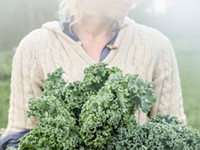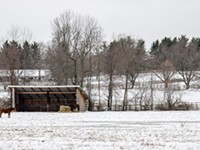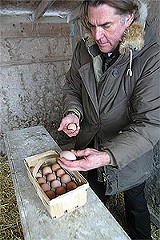[
{
"name": "500x250 Ad",
"insertPoint": "5",
"component": "15667920",
"parentWrapperClass": "",
"requiredCountToDisplay": "1"
}
]
Many people don't care what goes in one end of the hen or out the other. But some recent legislative chickenshit should make everyone pay attention.
Earlier this month the US Congress passed a nearly $400 billion omnibus spending bill. The measure funded vital federal programs from A-Z, but in line with past practice, legislators slipped some seemingly trivial items in at the last moment.
One such insertion dealt with the new "USDA Organic" label, or rather posed a challenge to it.
As a US Department of Agriculture factsheet explains, "organic" means food "produced without using most conventional pesticides; fertilizers made with synthetic ingredients or sewage sludge; bioengineering; or ionizing radiation." Before farmers and processors can use the official organic label, they must be certified by a government-approved inspector and pay an annual fee.
The little item in the spending bill amends this process: It will allow food processors to put the "organic" label on livestock or meat produced with some non-organic feed. Current rules say that organic meat and livestock must be raised on 100 percent organically grown feed. (There's a one-year partial exception for farms switching from conventional to organic methods.) The equation seems simple enough: organic means fully organic, or it means nothing.
So how did the item see the light of day? Shortly after the spending bill passed, national media traced it back to northern Georgia Congressperson Nathan Deal, who apparently acted on behalf of a large poultry producer in his district, Fieldale Farms Inc. Critics started crying foul and charging favoritism.
Fieldale is hanging tough, though.
Spokesperson Stephen Gray says the company only wants a system that would allow "alternative labeling" --- "80 percent organic," or the like. This, he says, would mirror what's allowed now with things like packaged organic cereal. Indeed, a USDA webpage describes four labeling categories for more-or-less organic cereals. Those in the top category (100 percent organic ingredients) can display the USDA organic label in full on the front of the box. Those in the bottom category (less than 70 percent organic ingredients) can't display the label upfront, but they can put the word "organic" in the ingredients list on the side panel.
Supply is the key issue, says Gray. It's hard, he says, to get enough organic feed to meet production quotas. But many observers suspect cost is the decisive factor. It's right in the text. A recent New York Times report puts it this way: The new exemption will allow producers to use non-organic feed if the USDA "certifies that organic feed is commercially available only at more than twice the price of conventional feed."
In any case, says Gray, "food safety is our number one priority." Fieldale, he says, doesn't use antibiotics, and the company has been "humane certified" by the Humane Society of the US.
The Humane Society, though, has been critical of efforts to change the organic rules.
"Granting an exemption," said an HSUS statement published last year, "would severely compromise the integrity of the 'organic' term and would provide a disincentive for the continued increase in production of organic feeds to keep up with rising demand..."
In fact, HSUS and other groups were lobbying hard last year to prevent any exemptions. They lost when the omnibus spending bill passed. But the exemption may not long stand. US Senator Patrick Leahy of Vermont and US Representative Sam Farr of California, both Democrats, have announced they'll introduce legislation to undo it.
Meanwhile, outrage has poured through the airwaves and into the headlines. The reaction has caught some people by surprise. They may have forgotten that, apart from a "radical" commitment to earth-friendly agricultural methods, organic farmers tend to be fairly conservative types --- their ranks include Republicans scattered throughout Bush country.
All over this region, organic advocates are defending their honor, so to speak.
Take Porter Farms, a 500-acre operation in Genesee and Orleans counties, around 40 miles west of the city.
Steve Porter, who runs the farm with his brother, is keeping an eye on Fieldale. He disputes the company's claim that raw supply is an issue. "There's organic feed out there," he says, though "not right down the road" in all cases. "You just have to truck it in, think further ahead," he says. "You're just not able to go down to the feed store" on short notice.
Porter says his own livestock isn't certified organic, but the farm does produce certified organic vegetables, grains, and soybeans. The farm, he says, also supports a "CSA" (community-supported agriculture project) that links consumers directly with the farm. About one-third of the CSA's members live in Monroe County, he says.
Porter Farms' organic produce can travel widely, as Steve tells it. Organic grains get shipped to Penn Yan, where millers Klaas and Mary-Howell Martensprocess them for delivery to end-users. (The Martens tend more than 1,000 acres of their own farmland, too.) But some Porter products travel a bit further. For example, the farm's organic soybeans have been going to Japan for tofu-making.
Which raises another concern: The national standards, says Steve Porter, are important not just for domestic consumption. They're meant to boost exports of US organics by assuring foreign buyers that American organics are the real McCoy.
Porter elaborates: His farm used to be certified by the Northeast Organic Farmers Association of New York (which now performs USDA certifications, as well). All well and good --- NOFA-NY is a respected organization. But with independent certifiers all over the map, foreign buyers sometimes have trouble distinguishing good certifiers from the not-so-good. A single national standard helps everybody.
Dependability is key here, according to Porter. "We've built up all this trust [regarding organics] over the last 10 to 20 years, and we'll blow it out the window because somebody is too lazy to line up their feed," he says. The Fieldale-inspired exemption, he says, "will just weaken people's beliefs in the standards. What do the standards mean if with the least little try you can get a waiver? It's like me saying, the bugs are getting the corn so I'll just spray them."
The organic-label fracas could even affect producers too small and poor to seek certification --- like Yve and Marty Zinaman, who run a 50-hen egg farm along Route 31 in Fairport.
The Zinamans supply eggs to the Abundance Cooperative Market, among other outlets. And they used to run a certified organic farm in Branchport, in the Finger Lakes region. That farm, says Yve, was certified by a not-for-profit group. "Now it costs a lot to get certified," she says. A NOFA-NY backgrounder says financial help is available, up to 75 percent of the fee. But for the smallest producers, even the remainder can be onerous. For example, Yve Zinaman says her farm netted only $300 total over the last seven years. At that rate, they wouldn't have enough profit even to pay $100 per year in fees. But the Zinamans have felt their work was mostly a service. "It's not that we were hoping to make money," says Yve.
The bottom line is a Catch-22: The Zinamans can't market their eggs as organic, whatever kind of feed they use. Yet their mode of production puts them in the same box with certified organic producers. So anything that denatures "organic" as a word and concept may cast doubt on their operation as surely as on comparatively huge outfits like Porter Farms.
The next weeks and months will be interesting as pro-organic organizations shift into high gear.
For example, at the very end of February, the nationwide Farmers Legal Action Group filed a legal complaint against the exemption. And the National Campaign for Sustainable Agriculture, based in Pine Bush, New York, is mounting a campaign against it. NCSA "has been at pains to show what the pitfalls are of how the USDA is managing the National Organic Program," says Wayne County organic farmer Elizabeth Henderson. A staffer with Genesee Valley Organic Community Supported Agriculture's Peacework Farm in South Butler, Henderson is involved with a range of national and regional groups.
A recent NCSA statement takes a stand on principle. "The purpose of our government," it says, "is to serve and protect the public interest, not to curry favor with deep pockets. The clear public interest here is in stringent organic standards that merit the confidence of consumers and ensure the integrity of organic production..."
Henderson obviously is worried about threats to organic certification, and so forth. "This chicken issue focuses [public] attention," she says. "What the hell makes [chickens] organic," she asks, if they're not fed 100 percent organic feed? But she doesn't get lost in the details. The feed issue, she says, "is the tip of the iceberg." Its significance, she says, lies in its relation to the main task: "figuring out how to live sustainably on the earth, how to reduce our ecological footprint."
Speaking of Farming, organic
-

Webster girds for civic battle over proposed lettuce farm
Nov 5, 2019 -

Fruition Seeds focuses on locally adapted food and flowers
Apr 5, 2017 -

Towns focus on farmland
Mar 6, 2013 - More »
Latest in News
More by Jack Bradigan Spula
-

The state of Main
Apr 14, 2004 -
School improvement: the price is wrought
Apr 7, 2004 -
Hour of power
Mar 31, 2004 - More »






